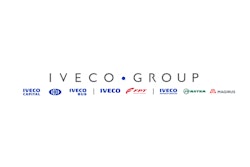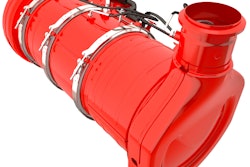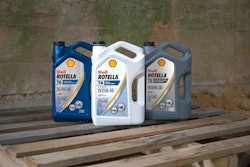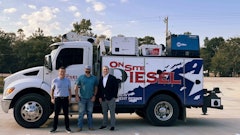From logistics operators to public transit authorities, the entire mass transport sector has a mandate to make its operations environmentally sustainable. Iveco and Iveco Bus, CNH Industrial’s commercial vehicles and passenger bus brands, have been investing in sustainable
alternative fuel technologies for more than 30 years combined. Natural gas has been one of their chief areas of concentration and as such, both brands have become a point of reference in the market, recently recording a number of significant European orders.
Gas Goalposts
In June of this year, Iveco announced a record order of 250 natural gas vehicles to Jacky Perrenot Group, one of France's leading transport logistics operators, which works internationally across all transport sectors. This exceptional order is for the supply of 200 Stralis NP (Natural Power) and LNG (Liquefied Natural Gas) tractor units, as well as 50 Stralis NP CNG rigid trucks. The recently launched Stralis Natural Power is the first long haul LNG-fueled heavy truck and offers an automated gearbox, long haul cab and autonomy of up to 1,500 km.
Following this announcement, Iveco Bus further confirmed an order for 80 natural gas buses for the city of Nantes, France from Nantes Métropole and Semitan (the local transport authority). The contract foresees the renewed supply of Urbanway 18 m buses powered by natural gas, with these first 80 units serving as an initial order.
Internationally, Iveco Bus won a record order to supply a fleet of 151 Crealis CNG BRT and Urbanway city buses to Baku, the capital city of Azerbaijan in 2014. In Brazil, Iveco’s market-specific Tector CNG truck was used for a years’ worth of test operations with Coca Cola for the 2014 FIFA World Cup. The truck was used to collect organic waste generated by fans. This organic waste was later transformed into renewable fuel. Subsequently in 2015, Iveco partnered with the São Paulo Business Union of Transport (SETCESP) and the São Paulo Gas Company (Comgás) to put CNG versions of its Daily light commercial vehicle into operation for São Paulo-based companies.
An important alternative
Natural gas stands today as the only serious alternative fuel with prospects for widespread use. It is the most effective technology choice and the one that is immediately available to counteract pollution in urban areas and reduce CO2 emissions. Natural gas also has the lowest carbon content of any existing fuel and significantly lowers Particulate Matter and Nitrogen Oxide levels, thus offering significant environmental advantages. Furthermore, natural gas engines halve noise levels, an important aspect for urban missions, such as public transit and night-time operations, such as waste collection.
Vehicles powered by natural gas are ideal for transport missions such as distribution, short and medium long-haul logistics, and municipal services such as waste collection. Iveco and Iveco Bus are the European leaders in natural gas vehicles. Last year more than 900 natural gas Iveco and Iveco Bus vehicles were delivered to customers. In 2015, 25% of low floor city bus units produced by Iveco Bus in Europe were powered by natural gas, resulting in substantial environmental benefits such as reduced CO2 emissions.
Biomethane: the next step
Natural gas represents a bridge to gas from renewable sources, such as biomethane, which is derived from refined biogas. Biomethane is important for CNH Industrial as it continues to pursue its mission to develop sustainable modes of transport. Biomethane can reduce CO2 emissions by up to 100% without any changes to the existing natural gas distribution network or natural gas vehicles that are available on today’s market. Most of CNH Industrial’s commercial vehicles and bus portfolio is fit to run on biomethane.
The production and use of biomethane not only provides environmental benefits, it has the further potential to create new local jobs and opportunities, hence why natural gas vehicles are an essential part of creating a circular economy that transforms our waste into organic fertilizer, renewable energy and fuel.
A prime example in Europe of the benefits of biomethane production is Lille Sequedin: France’s first biomethane station currently in operation in the city of Lille. The annual production of biomethane from this station is equivalent to 4,000,000 L of diesel, enough to operate 100 buses a year.
Iveco Bus has provided over 430 CNG buses to Lille, all of which are compatible with the biomethane produced at its Sequedin station. Iveco Natural Power Technology has allowed the city of Lille to be the first in France to operate a 100% non-diesel bus fleet.

















